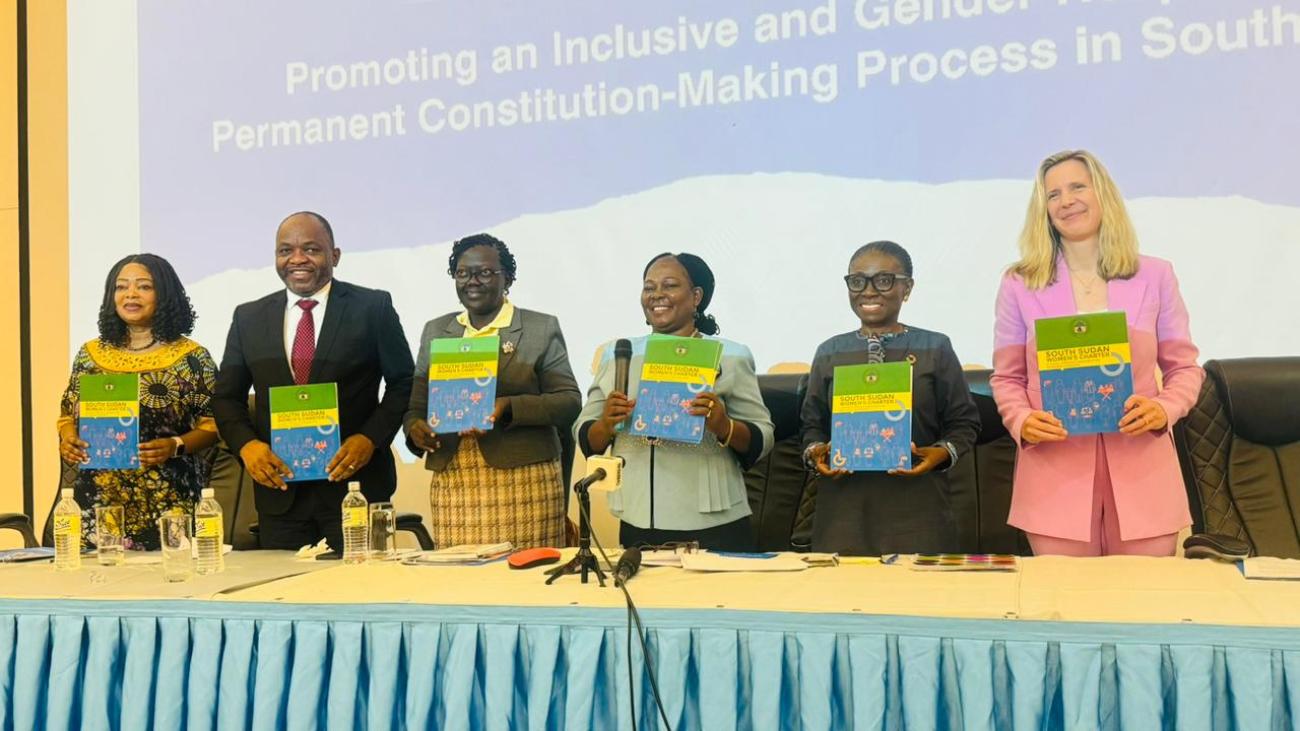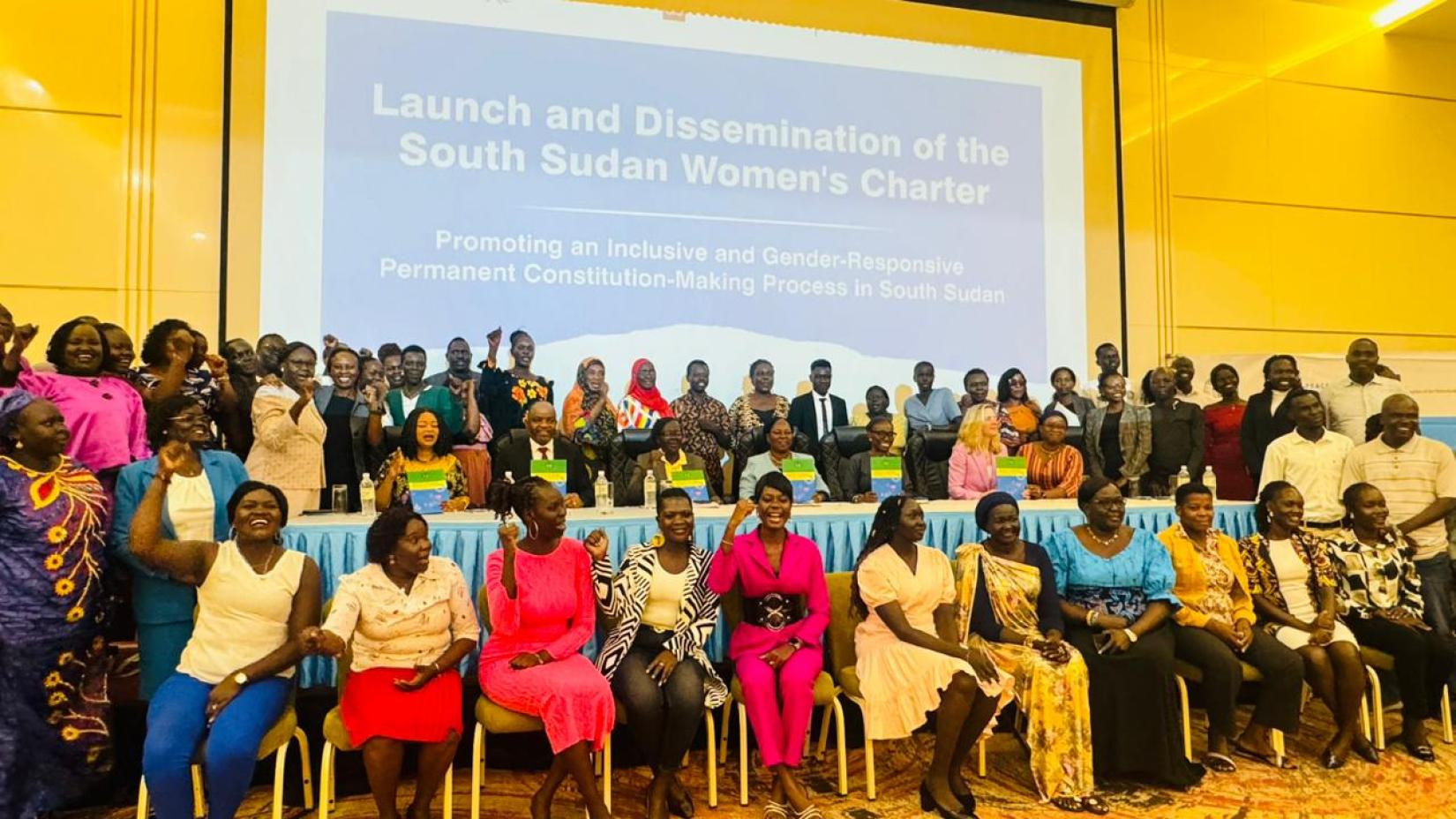South Sudan Launches the Women’s Charter in Juba: Empowering Women's Voices for Constitutional Inclusion

The Charter aims to enable women and girls to engage meaningfully with the Reconstituted National Constitutional Review Commission (R-NCRC) and influence the Pe
On May 29, the Ministry of Gender, Child, and Social Welfare (MGCSW) in collaboration with the Ministry of Peace Building and UN Women launched the South Sudan Women’s Charter in Juba. This landmark event was followed by a dissemination conference on May 30-31. The Charter aims to enable women and girls to engage meaningfully with the Reconstituted National Constitutional Review Commission (R-NCRC) and influence the Permanent Constitution-making process. Moreover, it will be a great tool for advocating for a gender-responsive electoral process and equal representation in political parties.
The launch was attended by prominent figures including Hon. Mary Nawai, Minister of Parliamentary Affairs; Hon. Aya Benjamin Warille Libo, Minister of Gender, Child, and Social Welfare; Hon. Pia Philip Michael, Undersecretary, Ministry of Peace Building; H.E. Marjan Schippers, Ambassador of the Kingdom of the Netherlands; Ms. Kiki Gbeho, DSRSG/RC/HC; Ms. Sarah Hendriks, Director of Policy, Program and Intergovernmental Division at UN Women HQ New York; Dr. Maxime Houinato, Regional Director at UN Women ESARO; Dr. Paulina Chiwangu, UN Women Country Representative South Sudan; Dr. Rukaya Mohammed, Deputy Country Representative UN Women South Sudan; alongside other government officials, UN agency representatives, women leaders, civil society members, and the media.
The Women’s Charter consolidates the demands, priorities, and concerns of women and girls across twelve thematic areas, including political participation, education, family rights, property ownership, health, economic and social welfare, equality, protection against GBV, access to justice, environmental security, and public finance management reforms. The Charter serves as a crucial tool to enshrine gender equality, eliminate discrimination, and ensure a 50% gender quota for women’s participation across all government levels.
The Charter is the result of extensive consultations at both national and state levels with diverse stakeholders, including women’s groups, civil society organizations, legal professionals, parliamentarians, schoolgirls, chiefs, persons with disabilities, elderly women, women in business, and government officials.
The Charter is the result of extensive consultations at both national and state levels with diverse stakeholders, including women’s groups, civil society organizations, legal professionals, parliamentarians, schoolgirls, chiefs, persons with disabilities, elderly women, women in business, and government officials.
Ms. Sarah Hendriks, Director for the Policy, Programme, Intergovernmental Division highlighted the Charter's significance, stating, “The Charter is timely and one of the most appropriate strategies to enhance the participation of women and girls in the constitution-making process. UN Women is hopeful that the Charter will empower women and girls to engage meaningfully with the National Constitutional Review Commission, addressing their diverse concerns collectively.”

Hon. Mary Nawai, Minister for Parliamentarian Affairs, “launch of the Women’s Charter represents a vital step in empowering women in politics and leadership. Developed through extensive consultations, the Charter consolidates the priorities and demands of women and girls for inclusion in the permanent constitution. Empowerment entails providing the necessary resources, skills, and a supportive environment to ensure women's meaningful engagement in the constitution-making process and beyond."
Ms. Anita Kiki Gbeho UN Deputy Special Representative and Resident & Humanitarian Coordinator, remarked,
"The South Sudan Women's Charter is a significant milestone in advancing women's rights in our country. Congratulations to all the women and men who generously contributed to its development, consolidating the priorities of women and girls in the constitution-making process".
Hon. Pia Philip Michael Undersecretary Ministry of Peacebuilding stressed "The Women’s Charter aims to amplify the voices of our women, ensuring their contributions are meaningful. I urge our government and international partners to turn these voices into actionable realities. The Charter tackles crucial issues such as marriage and family, prepares our girls and boys for the future, and ensures that men are not left behind"
H.E. Marjan Schippers expressed confidence that the Charter would ensure a gender-sensitive and inclusive permanent constitution
Following the launch, the Charter will be disseminated at the subnational level to raise awareness and encourage women’s participation in the constitution-making process. The MGCSW plans to submit copies of the Charter to the leadership of the R-NCRC, NEC, and PPC to ensure women’s concerns are considered in the permanent constitution, electoral process, and political party regulations.
Through this initiative, South Sudan takes a significant step toward gender equality, empowering women and girls to shape the future of their nation.









